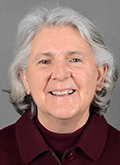2024 School of Veterinary Medicine Teaching Awards
The Zoetis Distinguished Veterinary Teacher Award
 This year’s Zoetis Distinguished Veterinary Teacher Award was presented to Jenni Punt. The Zoetis Distinguished Veterinary Teacher Award is the most prestigious teaching award in veterinary medicine. It is presented annually to a faculty member at each college of veterinary medicine in the United States. Its purpose is “to improve veterinary medicine education by recognizing outstanding instructors who, through their ability, dedication, character and leadership, contribute significantly to the advancement of the profession.” The entire Penn Vet student body votes on the recipient.
This year’s Zoetis Distinguished Veterinary Teacher Award was presented to Jenni Punt. The Zoetis Distinguished Veterinary Teacher Award is the most prestigious teaching award in veterinary medicine. It is presented annually to a faculty member at each college of veterinary medicine in the United States. Its purpose is “to improve veterinary medicine education by recognizing outstanding instructors who, through their ability, dedication, character and leadership, contribute significantly to the advancement of the profession.” The entire Penn Vet student body votes on the recipient.
Dr. Punt is an immunologist who has spent most of her career integrating research and teaching. A biology professor at Haverford College for eighteen years, she collaborated with undergraduates to understand the molecular and cellular basis for cell fate decisions during T cell and hematopoietic stem cell development. An associate dean for student research at Columbia University’s School of Physicians and Surgeons from 2013-2015, she was the founding director of an MD/MSc dual degree program focused on interdisciplinary medical scholarship—and continued to investigate the regulation of cell fate with students in the laboratory. Since returning to Penn Vet in 2017, Dr. Punt has become the associate dean of One Health and a professor of immunology in the pathobiology department. With the help of an innovative team, she is working to develop interprofessional educational programs that provide our new generation of leaders with skills needed to address complex challenges that impact human, animal, and environmental health. Dr. Punt continues to teach at all levels and collaborate with students in the laboratory, where they are currently working to understand the relationship between immune cell activity and animal welfare.
“Dr. Punt has been a close colleague, advisor, and friend throughout my deanship and I want to thank her for her partnership on several innovative, challenging, and transformative endeavors,” said Penn Vet dean Andrew Hoffman. “These include her leadership of the One Health Unit that has advanced at least seven new dual degree programs; the masters and certificate programs in animal welfare and behavior; the One Health in Action Research Community, funded through Penn’s Environmental Innovations Initiative; the One Health Study Design course; and the MPH-One Health Track, as well as teaching many hours in the VMD core and elective curriculum, and teaching undergraduates.
“Dr. Punt, a fierce and compassionate advocate of graduate and professional students, thinks and acts globally. Recently, Dr. Punt received the Council on International Veterinary Medical Education award for the ‘Education Exchange Project,’ an educational partnership with Lilongwe University of Agriculture and Natural Resources in Malawi. As an immunologist, Dr. Punt is well-known for her authorship, alongside Stranford, Jones, and Owens of the popular text entitled Kuby Immunology. Dr. Punt has served the community at Penn Vet with honor, in an exemplary manner, and to great effect.”
The William B. Boucher Award for Outstanding Teaching
The Boucher Award honors a house officer at New Bolton Center for excellent teaching, as was exemplified by William Boucher over four decades at Penn Vet. The graduating class votes on the recipient. The selection criteria include teaching skills, knowledge in the candidate’s area of expertise, responsiveness to the needs of the students, willingness to participate in off-hour seminars and discussions, and general dedication to New Bolton Center and to the veterinary profession.
 Sarah F. Colmer completed a residency in large animal internal medicine at New Bolton Center in 2022 and is currently a fellow in neurology. She has clinical and research interests in equine neurodegenerative disease and has always had passions for teaching students and clients alike, which she enjoys pursuing in her current role.
Sarah F. Colmer completed a residency in large animal internal medicine at New Bolton Center in 2022 and is currently a fellow in neurology. She has clinical and research interests in equine neurodegenerative disease and has always had passions for teaching students and clients alike, which she enjoys pursuing in her current role.
“Just for fun, and without divulging the context, I asked Dr. Colmer the other day to explain how you teach one to remember the cranial nerves, which is OOOTTAFAGVSH,” said Dean Hoffman. “She produced the following: ‘Such a great question. My favorite clean one, which my dad taught me, is: On Old Olympus’ Towering Tops, A Finn And German Viewed Some Hops. A friend uses: Only One Of The Two Athletes Felt Very Good, Victorious, And Healthy.’ So, in Dr. Colmer’s style, she conveyed not one, but two, mnemonic devices to remember the most complicated set of nerves in the body, fulfilling several of the great teacher qualities.”
“Sarah has always had a special talent for teaching, especially for teaching neurology,” said Amy Johnson, the Marilyn M. Simpson Associate Professor of Equine Medicine at the New Bolton Center. “No matter what she is doing, students gravitate towards Sarah because she radiates patience, kindness, and true passion for education. She inspires everyone around her to learn, diffuses tension in challenging situations, and makes NBC a happier place every day she is there. We are so grateful to have her with us!”
Class of 2024 Ryan Instructor Award

 After completing veterinary school and an internship at Penn Vet, Lillian Aronson completed a small animal surgical residency at the University of California, Davis. From 1994-1996, she was the coordinator of the renal transplantation program for animals at the veterinary school at Davis. Following her residency, she joined the faculty at Penn Vet in 1998 and launched the renal transplantation program there. Her clinical interests include all areas of soft tissue surgery, but especially microvascular surgery and complex urinary tract surgery, including renal transplantation and treatment of urolithiasis. Her research interests in the field of feline and canine renal transplantation include mechanisms of action of immunosuppressive therapy and cytokine gene expression in the presence of immunosuppressive therapy. Her other research interests include mechanisms of renal hypertrophy and the evaluation of pro-inflammatory cytokine levels in urine and peripheral blood to help differentiate causes of urinary tract disease. Dr. Aronson has lectured extensively locally, nationally, and internationally, and recently published the second edition of her textbook, Small Animal Surgical Emergencies. Dr. Aronson is currently a professor of surgery and is a diplomate of the American College of Veterinary Surgeons.
After completing veterinary school and an internship at Penn Vet, Lillian Aronson completed a small animal surgical residency at the University of California, Davis. From 1994-1996, she was the coordinator of the renal transplantation program for animals at the veterinary school at Davis. Following her residency, she joined the faculty at Penn Vet in 1998 and launched the renal transplantation program there. Her clinical interests include all areas of soft tissue surgery, but especially microvascular surgery and complex urinary tract surgery, including renal transplantation and treatment of urolithiasis. Her research interests in the field of feline and canine renal transplantation include mechanisms of action of immunosuppressive therapy and cytokine gene expression in the presence of immunosuppressive therapy. Her other research interests include mechanisms of renal hypertrophy and the evaluation of pro-inflammatory cytokine levels in urine and peripheral blood to help differentiate causes of urinary tract disease. Dr. Aronson has lectured extensively locally, nationally, and internationally, and recently published the second edition of her textbook, Small Animal Surgical Emergencies. Dr. Aronson is currently a professor of surgery and is a diplomate of the American College of Veterinary Surgeons.
Class of 2024 NBC Instructor Award
Maia Aitken graduated from Cornell University College of Veterinary Medicine in 2009. She completed her large animal surgery internship and residency at New Bolton Center, followed by a fellowship in large animal emergency and critical care. She is currently an assistant professor of clinical emergency and critical care at New Bolton Center. Dr. Aitken is a diplomate of the American College of Veterinary Surgeons and the American College of Veterinary Emergency and Critical Care. She is also director of New Bolton Center’s internship program.
Class of 2025 Lecture Teaching Award
 Patricia L. Sertich is an associate professor-clinician educator in reproduction and behavior at Penn Vet and is currently section chief of reproduction and behavior. Based at the Georgia and Philip Hofmann Research Center for Animal Reproduction at New Bolton Center since 1983, Dr. Sertich evaluates large animals for breeding soundness and develops treatment plans to optimize their fertility. Dr. Sertich provides consultation on reproductive issues of patients in the George D. Widener Hospital for Large Animals and is a critical member of its high-risk pregnancy management team. As a diplomate of the American College of Theriogenologists (ACT), she currently serves as its secretary and is on the ACT Examination Committee, which determines board certification for veterinarians specializing in animal reproduction. Dr. Sertich has mentored many ACT diplomates and received numerous teaching awards, including three Carl J. Norden Distinguished Teaching Awards and the Christian R. and Mary F. Lindback Foundation Award (
Patricia L. Sertich is an associate professor-clinician educator in reproduction and behavior at Penn Vet and is currently section chief of reproduction and behavior. Based at the Georgia and Philip Hofmann Research Center for Animal Reproduction at New Bolton Center since 1983, Dr. Sertich evaluates large animals for breeding soundness and develops treatment plans to optimize their fertility. Dr. Sertich provides consultation on reproductive issues of patients in the George D. Widener Hospital for Large Animals and is a critical member of its high-risk pregnancy management team. As a diplomate of the American College of Theriogenologists (ACT), she currently serves as its secretary and is on the ACT Examination Committee, which determines board certification for veterinarians specializing in animal reproduction. Dr. Sertich has mentored many ACT diplomates and received numerous teaching awards, including three Carl J. Norden Distinguished Teaching Awards and the Christian R. and Mary F. Lindback Foundation Award (). Grateful that she can teach students in all four years of veterinary school, Dr. Sertich is able to identify students with a strong interest in reproduction early. As the faculty liaison for the student chapter of the Society for Theriogenology, she facilitates training for those students to develop excellent clinical skills, provides opportunities to gain clinical experience, and connects them with practices that will direct them to a satisfying and productive career in veterinary medicine. For these efforts, she received the 2022 David E. Bartlett Award for Lifetime Achievement in Theriogenology from the Society for Theriogenology.
Class of 2025 Laboratory Teaching Award

 Heather Rudolph is a certified veterinary technician who received her training from Harcum College. She also earned a postgraduate certificate and diploma in veterinary education from Royal Veterinary College. As the clinical skills lab director, Ms. Rudolph has developed and manages the hands-on lab for students at Penn Vet. Her students have access to models to practice skills such as restraint, venipuncture, urinary catheter placement, cystocentesis, and suturing. Before coming to Penn Vet, Ms. Rudolph worked in emergency and critical care at Crown Veterinary Specialists and Quakertown Veterinary Clinic.
Heather Rudolph is a certified veterinary technician who received her training from Harcum College. She also earned a postgraduate certificate and diploma in veterinary education from Royal Veterinary College. As the clinical skills lab director, Ms. Rudolph has developed and manages the hands-on lab for students at Penn Vet. Her students have access to models to practice skills such as restraint, venipuncture, urinary catheter placement, cystocentesis, and suturing. Before coming to Penn Vet, Ms. Rudolph worked in emergency and critical care at Crown Veterinary Specialists and Quakertown Veterinary Clinic.
Class of 2026 Lecture Teaching Award
Susan Bender has been part of the Penn Vet community since 2003. She graduated from the combined VMD-PhD program in 2011 and completed an anatomic pathology residency in 2014, becoming board-certified by the American College of Veterinary Pathologists. She joined the New Bolton Center faculty in 2015 and is currently an assistant professor of clinical pathobiology, section head of the biopsy and immunohistochemistry services, and co-director of the anatomic pathology residency program. Her main professional interest is forensic pathology, and she earned her MS in veterinary forensic science from the University of Florida in 2019. In the new core curriculum at Penn Vet, Dr. Bender is co-leader of the first-year evidence-based veterinary medicine course and teaches a variety of topics in the second-year blocks.
Class of 2026 Laboratory Teaching Award

 Deborah Gillette attended Purdue University as an undergraduate and veterinary school at Cornell University. After completing a pathology residency at Penn Vet, she earned a PhD in comparative pathology at the University of California, Davis, and became board certified. Dr. Gillette joined the faculty at the University of Wisconsin for one year before joining the pathology faculty at New Bolton Center. During this time, she received a master’s degree in health professions education from Penn’s Graduate School of Education. Dr. Gillette left Penn Vet to become a pathologist in the toxicology department of Rohm and Haas Company (now part of Dow Chemical). After retiring from the industry, she returned to Penn Vet in 2018, working for the pathology department at the Philadelphia campus. Dr. Gillette also serves as photo editor for the journal Veterinary Pathology.
Deborah Gillette attended Purdue University as an undergraduate and veterinary school at Cornell University. After completing a pathology residency at Penn Vet, she earned a PhD in comparative pathology at the University of California, Davis, and became board certified. Dr. Gillette joined the faculty at the University of Wisconsin for one year before joining the pathology faculty at New Bolton Center. During this time, she received a master’s degree in health professions education from Penn’s Graduate School of Education. Dr. Gillette left Penn Vet to become a pathologist in the toxicology department of Rohm and Haas Company (now part of Dow Chemical). After retiring from the industry, she returned to Penn Vet in 2018, working for the pathology department at the Philadelphia campus. Dr. Gillette also serves as photo editor for the journal Veterinary Pathology.
Class of 2027 Lecture Teaching Award
Stephen Cole is currently an assistant professor of clinical microbiology at Penn Vet. His research seeks to understand and mitigate the spread of extensively drug resistant bacteria in companion animals and to establish best educational practices in antimicrobial stewardship to promote proper use of critical drugs. He is a dedicated educator who currently directs the core courses at Penn Vet—in particular, a novel course focused on evidenced-based, bench-to-bedside veterinary medicine. Dr. Cole’s primary clinical specialties include clinical bacteriology and mycology, antimicrobial therapy and selection, and infectious diseases. Dr. Cole is a diplomate of the American College of Veterinary Microbiology (bacteriology/mycology, immunology, virology), a recipient of the Peggy Cotter Early Career Award from the American Society for Microbiology, and a One Health Scholar of the American Association of Veterinary Medical Colleges.
Class of 2027 Laboratory Teaching Award
 Elizabeth Woodward joined the department of biomedical sciences in 2016 as a clinical assistant professor. Before her faculty appointment, she held postdoctoral research appointments in the Reference Andrology Laboratory at New Bolton Center and at the University of Kentucky’s Gluck Equine Research Center, where she also earned her doctorate studying equine reproductive physiology. Her primary faculty role is teaching first and second-year students. She is a course organizer for three blocks and two capstones, and teaches concepts across several blocks in anatomy, physiology, and histology. Dr. Woodward serves on several committees and is a faculty adviser for the Penn Vet Wine Club. Her research interests are in the field of reproductive physiology, specifically in the areas of sperm physiology and equine endometritis. Dr. Woodward received the Zoetis Distinguished Teacher Award in 2022 (Almanac May 31, 2022).
Elizabeth Woodward joined the department of biomedical sciences in 2016 as a clinical assistant professor. Before her faculty appointment, she held postdoctoral research appointments in the Reference Andrology Laboratory at New Bolton Center and at the University of Kentucky’s Gluck Equine Research Center, where she also earned her doctorate studying equine reproductive physiology. Her primary faculty role is teaching first and second-year students. She is a course organizer for three blocks and two capstones, and teaches concepts across several blocks in anatomy, physiology, and histology. Dr. Woodward serves on several committees and is a faculty adviser for the Penn Vet Wine Club. Her research interests are in the field of reproductive physiology, specifically in the areas of sperm physiology and equine endometritis. Dr. Woodward received the Zoetis Distinguished Teacher Award in 2022 (Almanac May 31, 2022).
